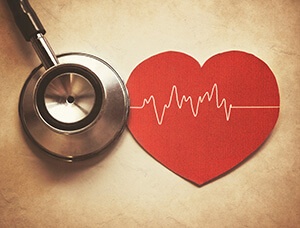Heart health Q&A with Benjamin Johnson, MD
Editor's Note: CentraCare Heart & Vascular Center Cardiologist Benjamin Johnson, MD, sat down to talk on Facebook Live to discuss some heart health questions on Feb. 6, 2018.
Here are some of the questions asked during the Facebook Live event. Dr. Johnson’s full interview is available below. Some of the text below has been edited for length and clarity.
Q: What are some of the warning signs or symptoms of heart disease?
Dr. Johnson: You can have the symptoms like you see on the movies or the TV shows where there's the “elephant sitting on my chest” and I need to go and get this checked out right now. There are also other symptoms that are more nonspecific that can occur. People can sometimes experience breathing difficulties with exertion, increased fatigue, lack of energy, leg swelling, etc. It is very important to be in tune with your body and know when you're experiencing something different and potentially get evaluated for that.
Q: What are some things that a person can do to lower the risk of heart disease?
Dr. Johnson: We always tell our patients to get some exercise, up to 4-7 days per week. During your exercises, try to do an activity where you get your heart rate up and sustained at an elevated rate for 20-30 minutes if you can. We also recommend dietary modifications that include a well-balanced diet that's low in trans fats, saturated fats, sugars and carbohydrates. If you are a smoker – quit! If you are a non-smoker - don't take up smoking! Avoid becoming obese at all costs.
Q: How are the signs of heart disease different from men and women?
Dr. Johnson: Men and women can experience different symptoms in the setting of a cardiac event. In the setting of a heart attack, oftentimes, men will experience the symptoms that you typically associate with heart disease or heart attacks — such as that “elephant on my chest” that we talked about earlier. Women, on the other hand, oftentimes experience more non-specific symptoms such as nausea, abdominal pain, arm pain, back pain or jaw pain. These are things that are not often associated with your heart. This is the reason why women often present later with their cardiac events than men do.
Q: If your family does have a history of heart disease, when should you get your heart checked?
Dr. Johnson: That's an outstanding question. Oftentimes we will ask you at what age your family member had their event as this sometimes helps us to gauge when to start screening you. One of the important screening tools that I use is a low dose, non-contrast CT scan of the heart where we look for calcification in the heart arteries. This is called a coronary calcium scan and can provide important information about what your risk is of having a coronary event. The only downside to this test is that calcium in your coronary arteries typically does not develop until you're at least 40 years of age or more. So oftentimes using this screening tool before the age of 40 is not all that helpful. In that case, we would usually use a symptom-driven approach where we will pursue testing if you are having concerning symptoms.
Q: Is it a fact or myth that about one in 10 Americans have some sort of heart disease?
Dr. Johnson: That's actually a myth. It's closer actually to about one in four. There is approximately 92 million American adults living with heart disease which is about 25% of the population.
Q: Fact or myth? Low-dose aspirin can help you avoid another heart attack?
Dr. Johnson: That is true. For anyone who's had a heart attack, it is a Class 1 indication — that's our highest level of recommendation — that you be on an aspirin. It can be a baby aspirin and should be taken indefinitely for the rest of your life. If you have not previously had a heart attack, the benefit of taking daily aspirin is less clear.
